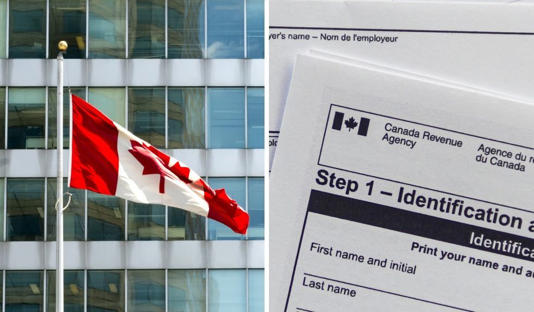
As tax season fast approaches, navigating this time of year is certainly no easy feat and with a slew of new changes outlined by the Canada Revenue Agency, you may not be totally up to date ahead of filing your 2023 income taxes.
We’re hoping to make filing your taxes in Canada a bit easier to deal with thanks to a detailed list of the newly announced CRA changes that could affect your 2023 taxes, including a first home savings account, a home renovation tax credit, COVID-19 benefit repayments and changes to other financial programs including the Canada Workers Benefit and the Climate Action Incentive.
Electronic remittances and/or payments above $10,000
Per the Canada Revenue Agency — as of January 1, 2024, any remittances or payments destined for the Receiver General of Canada exceeding $10,000 should be conducted via electronic means. Failure to adhere to this requirement may result in penalties unless the payer can demonstrate that electronic remittance is not reasonably feasible.
For more information, go to Payments to the CRA.
Advanced Canada Workers Benefit (ACWB)
“Advance payments of the Canada workers benefit (CWB) are now issued automatically under the ACWB to those who received the benefit in the previous tax year,” the CRA indicated.
Consequently, Form RC201, Canada Workers Benefit Advance Payments Application, has been discontinued.
Starting in 2023, amounts from your RC210 slip must be declared on Schedule 6, Canada Workers Benefit, to compute the figure to be entered on line 41500 of your tax return. If you have an eligible spouse, you have the option to designate who will claim the basic amount for the CWB, regardless of which spouse received the RC210 slip for the basic amount.
Climate Action Incentive Program (CAIP)
Per the CRA, the Government of Canada has declared its plan to increase the rural supplement to 20%, doubling its current rate, effective from April 2024. Additionally, it aims to maintain the use of the census metropolitan areas established by the 2016 Census for the tax years 2023 and 2024.
Deduction for tools (tradesperson & apprentice mechanics)
“Starting in 2023, the maximum employment deduction for tradespersons’ eligible tools has increased from $500 to $1,000,” the CRA said.
As a result, the threshold for expenses eligible for the apprentice mechanics tools deduction has also changed. For more information about tool deductions for tradespersons and apprentice mechanics, see line 22900 or Guide T4044, Employment Expenses.
COVID-19 benefit repayments
According to the Canada Revenue Agency, federal, provincial and territorial COVID-19 benefit repayments made after December 31, 2022, can be claimed as a deduction on line 23200 of your 2023 return.
First Home Savings Account (FHSA)
Per the CRA, the First Home Savings Account (FHSA) is a newly established registered plan designed to assist individuals in saving for their initial home purchase.
Effective April 1, 2023, contributions made to an FHSA are typically tax-deductible, and withdrawals meeting the qualifying criteria for the purchase of a home are exempt from taxation.
If you opened one or more FHSAs in 2023, complete Schedule 15, FHSA Contributions, Transfers and Activities.
Multigenerational Home Renovation Tax Credit (MHRTC)
The Multigenerational Home Renovation Tax Credit (MHRTC) is a recently introduced refundable tax credit permitting eligible individuals to assert specific renovation expenses aimed at establishing a secondary unit within an eligible dwelling to accommodate a qualifying individual alongside their eligible relation, the CRA said.
If qualified, you have the opportunity to claim up to $50,000 in eligible expenditures for each qualifying renovation carried out, with a maximum credit limit of $7,500 for each eligible claim you submit.
Property flipping
Starting January 1, 2023, any profit arising from the sale of a residential unit (including rental properties) situated in Canada, or a right to obtain a residential unit in Canada, which you possessed or held for less than 365 consecutive days before its sale, will be classified as business income rather than a capital gain.
The only exception is whether the property was already categorized as inventory or the sale was prompted by, or in expectation of certain life events, per the CRA.
Return of fuel charge proceeds to farmers tax credit
According to the CRA, the Return of fuel charge proceeds to farmers’ tax credit is now available to self-employed farmers and individuals who are members of a partnership operating a farming business with one or more permanent establishments in the following provinces:
- Alberta
- Manitoba
- New Brunswick
- Newfoundland and Labrador
- Nova Scotia
- Ontario
- Prince Edward Island
- Saskatchewan
More about the Return of fuel charge proceeds to farmers’ tax credit
Temporary flat rate method
The temporary flat rate method does not apply to 2023. Therefore, taxpayers looking to claim home office expenses for 2023 will be required to use the detailed method and get a completed Form T2200, Declaration of Conditions of Employment, from their employer, the CRA indicated.
This article’s cover image was used for illustrative purposes only.
Source: MTL Blog






